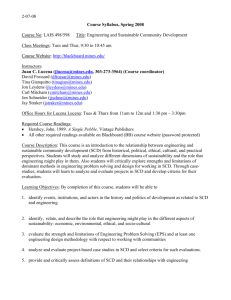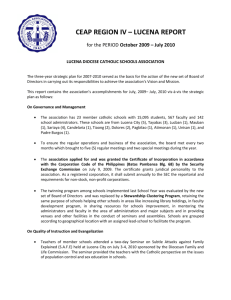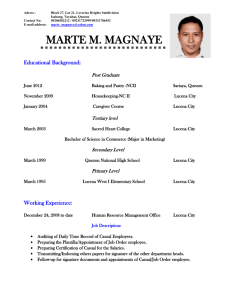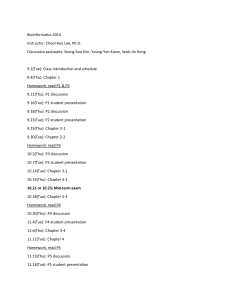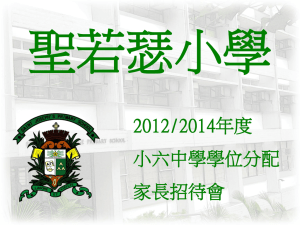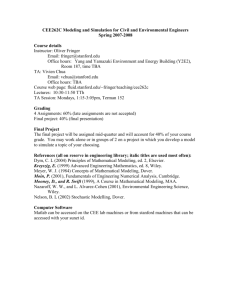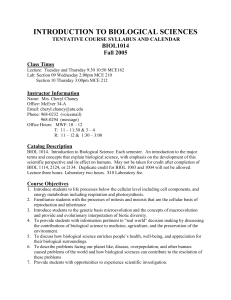Engineering and Sustainable Community Development
advertisement
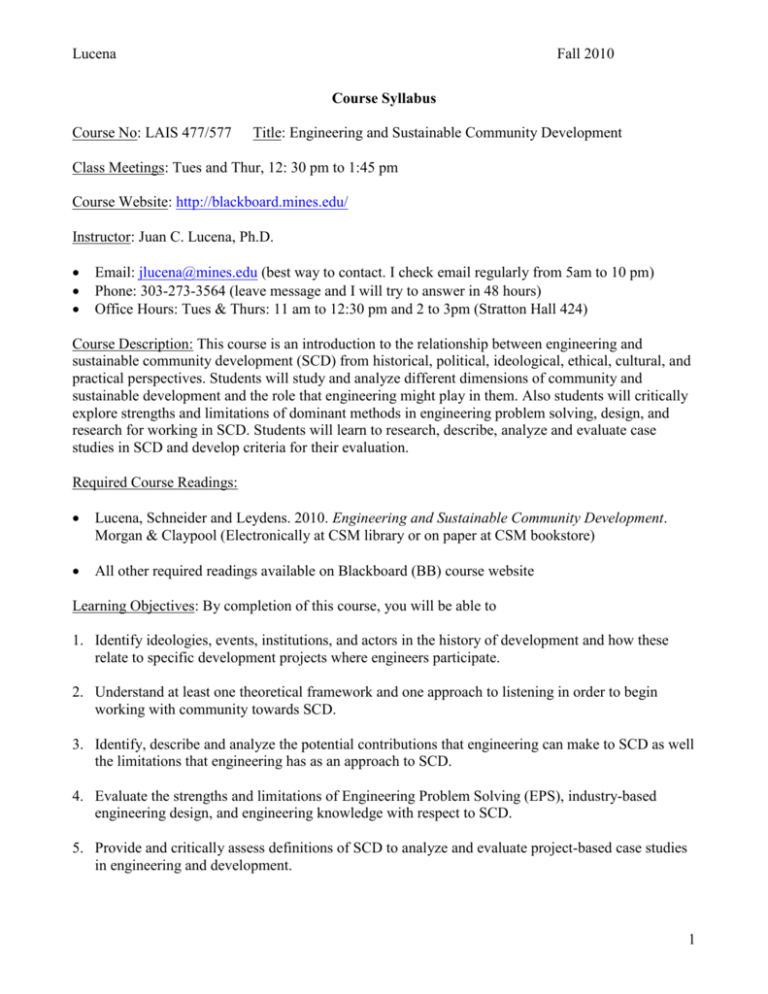
Lucena Fall 2010 Course Syllabus Course No: LAIS 477/577 Title: Engineering and Sustainable Community Development Class Meetings: Tues and Thur, 12: 30 pm to 1:45 pm Course Website: http://blackboard.mines.edu/ Instructor: Juan C. Lucena, Ph.D. Email: jlucena@mines.edu (best way to contact. I check email regularly from 5am to 10 pm) Phone: 303-273-3564 (leave message and I will try to answer in 48 hours) Office Hours: Tues & Thurs: 11 am to 12:30 pm and 2 to 3pm (Stratton Hall 424) Course Description: This course is an introduction to the relationship between engineering and sustainable community development (SCD) from historical, political, ideological, ethical, cultural, and practical perspectives. Students will study and analyze different dimensions of community and sustainable development and the role that engineering might play in them. Also students will critically explore strengths and limitations of dominant methods in engineering problem solving, design, and research for working in SCD. Students will learn to research, describe, analyze and evaluate case studies in SCD and develop criteria for their evaluation. Required Course Readings: Lucena, Schneider and Leydens. 2010. Engineering and Sustainable Community Development. Morgan & Claypool (Electronically at CSM library or on paper at CSM bookstore) All other required readings available on Blackboard (BB) course website Learning Objectives: By completion of this course, you will be able to 1. Identify ideologies, events, institutions, and actors in the history of development and how these relate to specific development projects where engineers participate. 2. Understand at least one theoretical framework and one approach to listening in order to begin working with community towards SCD. 3. Identify, describe and analyze the potential contributions that engineering can make to SCD as well the limitations that engineering has as an approach to SCD. 4. Evaluate the strengths and limitations of Engineering Problem Solving (EPS), industry-based engineering design, and engineering knowledge with respect to SCD. 5. Provide and critically assess definitions of SCD to analyze and evaluate project-based case studies in engineering and development. 1 Lucena Fall 2010 Teaching Philosophy: Here are my core believes about teaching and learning: I believe that education should be about students’ learning more than about teachers’ teaching. Teachers should trust students and facilitate their learning. Students come to my classes with a set of experiences, previous knowledges (note the plural), expectations, conceptions and misconceptions that shape how they learn. Our collective job (not just mine) is to make these explicit, to critically assess how these enhance (or hinder) your learning, and to provide you with a new set of experiences, knowledges and hopefully a new way of looking at the world. More than giving you a grade, my main responsibility is to help you acquire a life-long commitment to “check your knowledge”, i.e., to critically question what you know (and don’t know), how you came to know it, what you know it for, and to get ready to acquire new knowledge for new circumstances. Your responsibility is to learn this skill and apply it for the rest of your life. I believe that student learning is an evolutionary process that requires time to process and question new ideas and concepts. The acquisition of new knowledge, especially one that might challenge your core believes and values, often elicits strong resistance. Our shared responsibility is to acknowledge this and help you move beyond this resistance. As resistance fades away as the semester unfolds, your learning should increase, your thinking should become more sophisticated and your attitude for new knowledge becomes more welcoming. This course is built in such a way that will allow you the opportunity to evolve in your learning. I believe that the creation and acquisition of new knowledge is a social process. You will have plenty of opportunities to develop and process your own individual ideas but soon you will be cocreating and co-acquiring knowledge with your peers. Pair and group activities in the classroom are fundamental elements of this collaborative process. Hence your active participation in these will be highly valued. Yet the writing of quizzes and papers is an individual activity where you are expected to follow CSM’s honor code. I believe that our writing is a reflection of our ideas. To produce good, clear and powerful writing, we need to have good, clear and powerful ideas (and vice versa). This requires close and in-depth reading, a commitment to listening, opportunities to test ideas with others, time to reflect about these exchanges, and a continuous engagement with our own drafts. Hence good writing cannot happen the night before a paper is due. My responsibility is to guide you towards good readings, help you develop your listening, provide you with opportunities to test ideas with others, and allow you ample time between the assignment of a paper and its due date. Your responsibility is to engage the readings, be willing to listen, share your ideas with others, and give yourself plenty of time to outline, draft, edit and re-edit your writing. Furthermore, I believe in the power of diverse ideas and arguments. All of us come into this course with opinions (weak and strong). Our collective responsibility is to turn these into powerful and wellsupported arguments that can hopefully have an impact on the world. To do this we need a respectful and nurturing environment to share opinions and explore ways to turn them into well-crafted arguments. Hence one of my primary roles is to construct and maintain such classroom environment, constructively challenge your opinions and help you transform them into well-supported arguments. Your role is to be open to this challenge and to be respectful of the classroom environment and of others’ attempts at transforming their opinions. 2 Lucena Fall 2010 Course Policies: This course consists of in-depth reading, lectures, in-class collaborative exercises, films, quizzes and papers. As an educator, one of my responsibilities is to put great deal of effort and thinking in developing these elements and offering them to you to help you learn. As a student, your responsibility is to reciprocate this effort by seriously exploring the reading assignments, being prepared to discuss them in class, actively participate in collaborative learning, and effectively and critically incorporate this material in quizzes, papers, and (hopefully) in your own thinking and practices. As I expect you to evaluate the quality of my teaching and mentoring, you should expect me to evaluate the quality of your learning and intellectual growth in this course. Ours is a partnership of teaching, learning and exploration. Hence you should expect that higher quality of discussion, exploration and writing will warrant you higher grades while lesser quality or incomplete work will warrant you lesser grades. Your grades are based on both the quality of your performance (not so much on how many hours you spend working) and your level of commitment to the learning process and objectives. Specifically, here are the expectations for you to ensure a good grade in this course and for me to get good teaching evaluations from you You should expect a good grade from me if you complete assigned readings on time, be ready to discuss and engage them, and use them effectively throughout the course I should expect good teaching evaluations from you if I assign relevant readings and provide you with opportunities to explore these readings in ways that enhance your learning attend scheduled class meetings regularly since without you the learning environment will be void of your perspective and your potential to teach others show up prepared to teach class and provide a learning environment that will encourage all students to come to all classes participate in class discussions and activities regularly by raising questions and making contributions that are relevant and enhance the learning of other students, including making mistakes so you and others can learn from these (if you text, browse or do other homework you will be robbing the class from your ability to teach others) prepare relevant and effective classroom activities and allow students the opportunity to make mistakes in order to facilitate learning complete ALL readings, quizzes and papers on the assigned dates, displaying commitment to learning, scholarship and further inquiry assign relevant quizzes and papers, grade them in a timely fashion commit to and apply CSM’s Student Honor Code when completing quizzes and papers in this course commit to and apply standards of professionalism in my teaching, including developing original teaching material or giving due credit to others when using their material 3 Lucena Fall 2010 Grading: Class attendance (100 pts) Now that you understand my teaching philosophy, it should be no surprise that class attendance is extremely important and valued. Hence 10 points will be deducted for each unexcused absence. Excused absences are ONLY the following: official sport varsity team travel, a medical condition excused in writing by doctor, a personal matter excused in writing by the Dean of Students office, jury duty, military duty or common examinations as indicated in writing by the department giving the examination. Participation, commitment and respect for the learning process (150 pts): In this area I value four elements: engagement (how interested are you in doing your individual or group call activities?), relevance (how appropriate are your contributions to the learning environment?), being on time with your work (are you turning in work on time and keeping up with the readings?), and respect (are you respectful of others’ perspectives and of the classroom environment?). I welcome many types of contributions to class discussion, and two in particular. Comments that feature a knowledge claim supported by well-structured, logical, and relevant evidence advance everyone’s collective understanding. Note that well-supported claims are not just stated opinions. Second, I recognize that not all thoughts come out fully formed, so I also invite exploratory contributions to class discussion, comments that are characterized more by questioning and inquiring than by answering and defending a position. I will begin actively seeking student participation after the fourth class meeting in order to give everyone an opportunity to first feel comfortable with the classroom climate, topics, nature of discussion, instructor, and process writing. Since texting, online searching and/or doing homework for other courses have become pervasive activities, I must clearly state that doing any of these in class will significantly impact this part of your grade. Papers (500 pts): A proposal and 3 papers are required for this course. Papers will increase in complexity and points as your learning, knowledge and critical thinking evolve. Specific writing guidelines and expectations will be distributed later. Late papers will incur in a 10-point penalty for every day after the due date. The expected point distribution is as follows: Proposal on a development project (50 pts) Paper 1 on historical and ideological dimensions of development (100 pts) Paper 2 on community dimensions of development (150 pts) Paper 3 on engineering and community development (200 pts) Quizzes (250 pts): Every now and then, you will write in-class an/or take-home quizzes on key concepts from the readings and/or key questions that emerge throughout the course. These will help you develop your ideas and gain clarity on key concepts as you move towards more complex writing in your papers. Points for each take-home quiz will be determined at the time of assignment. There are no make up quizzes unless you have an excused absence (see above). Writing Center You are strongly encouraged to use the resources and experience available at CSM’s Writing Center for writing your papers. The Center is located in Stratton 309, and their phone number is 303-273-3085. 4 Lucena Fall 2010 SCHEDULE (Due to the flexibility needed to schedule external speakers, readings might change at times. Students will be informed in advance.) I. WHAT IS DEVELOPMENT? DATE Tue 8/24 TOPIC Introduction READING/ASSIGNMENT DUE Self-assessment and interpretation of course objectives Thu 8/26 What is development? World Bank. 2004. “What is development?” Tue 8/31 What is development? Easterly, William. 2006 “Planners vs. Searchers” from The White Man’s Burden Lucena, Schneider, Leydens. 2010. “Building Organizations and Mapping Communities: A Civil Engineer’s Work after Discovering Water” from Engineering and Sustainable Community Development. Jackson, Jeffrey. 2005. “Building Dams” and “Fixing Dams” from The Globalizers Project proposal guidelines distributed Thu 9/2 Student process Tue 9/7 Engineers and Big Development Lucena, Schneider, Leydens. 2010. “Engineers and Development” from Engineering and Sustainable Community Development. Thu 9/9 Engineers and small development Lucena, Schneider, Leydens. 2010. “Why Design for Industry Will Not Work as Design for Community” from Engineering and Sustainable Community Development. Tue 9/14 Student process Project proposal due II. SUSTAINABLE COMMUNITY DEVELOPMENT (SCD) Thu 9/16 Student process Tue 9/21 What is community? Thu 9/23 What is community? Guest: Prof. Jen Schneider On project proposals; how to research projects; available resources; difficulties and opportunities. Paper 1 guidelines distributed Lucena, Schneider, Leydens. 2010. “Engineering with Community” from Engineering and Sustainable Community Development. Lucena, Schneider, Leydens. 2010. “Engineering with Community” from Engineering and Sustainable Community Development. Tue 9/28 A theoretical framework for SCD Bridger and Luloff, “Toward an interactional approach to sustainable community development” 5 Lucena Fall 2010 Thu 9/30 Student process Tue 10/5 Community development Guest: Dave Frossard Community TBA Lucena, Schneider, Leydens. 2010. “Listening to Community” from Engineering and Sustainable Community Development. Thu 10/14 Listening Guest: Prof. Jon Leydens Listening Tue 10/19 Fall Break Thu 10/7 Tue 10/12 Film: Still the Children are Here (85 min) Paper 1 due; paper 2 guidelines distributed Lucena, Schneider, Leydens. 2010. “Listening to Community” from Engineering and Sustainable Community Development. No class III. ENGINEERING AND SUSTAINABLE COMMUNITY DEVELOPMENT Thu 10/21 Student process More on researching a project paper Tue 10/26 How have engineers engaged communities? Williams, Bess. 2007. “Small-Scale Technologies for the Developing World: Volunteers for International Technical Assistance, 1959-1971.” Thu 10/28 How have engineers engaged communities? Engineering vs. Local Knowledges Jackson, Jeffrey. 2005. “The Expats” from The Globalizers: Development Workers in Action Thu 11/4 On local knowledge Film: Dreamers of Arnhem Land (50 min) Paper 2 due; paper 3 guidelines distributed Tue 11/9 Case studies on SCD: India Lucena, Schneider, Leydens. 2010. “Case Study: Sika Dhari’s Windmill” from Engineering and Sustainable Community Development. Thu 11/11 Student process Film: Dam/Age Tue 11/16 Case studies on SCD: ISF Colombia and Italy. Guest: Prof. Catalina Ramirez, founder of ISF Colombia Ramirez, et al. 2010. Participative Methodology for Local Development: The Contribution of Engineers Without Borders from Italy and Colombia: Towards the Improvement of Water Quality in Vulnerable Communities Tue 11/2 Scott, James. 1998. “Thin Simplifications and Practical Knowledge: Metis” from Seeing Like a State. 6 Lucena Fall 2010 Thu 11/18 Case studies on SCD Tue 11/23 Independent study Thu 11/25 Thanksgivings No class Tue 11/30 Resistance, transformation, and learning in ESCD Lucena, Schneider, Leydens. 2010. “Students’ perspectives on ESCD: A course model” from Engineering and Sustainable Community Development. Thu 12/2 Student process Paper 3 due Tue 12/7 Can engineers be partners and leaders in SCD? Lucena, Schneider, Leydens. 2010. “Beyond Engineers and Community: A Path Forward” from Engineering and Sustainable Community Development. Thu 12/9 Last class Student self-assessment on their relationship with SCD 7
